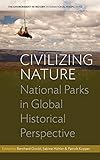Civilizing Nature : National Parks in Global Historical Perspective / ed. by Bernhard Gissibl, Patrick Kupper, Sabine Höhler.
Material type: TextSeries: Environment in History: International Perspectives ; 1Publisher: New York ; Oxford : Berghahn Books, [2012]Copyright date: ©2012Description: 1 online resource (304 p.)Content type:
TextSeries: Environment in History: International Perspectives ; 1Publisher: New York ; Oxford : Berghahn Books, [2012]Copyright date: ©2012Description: 1 online resource (304 p.)Content type: - 9780857455253
- 9780857455277
- Environmental protection -- History
- Environmentalism -- History
- Globalization -- History
- National parks and reserves -- Government policy -- History
- National parks and reserves -- History
- National parks and reserves -- Political aspects -- History
- Protected areas -- History
- HISTORY / General
- Environmental Studies (General), History (General), Heritage Studies
- 911 22/gereng
- SB481 .C57 2012
- SB481
- online - DeGruyter
| Item type | Current library | Call number | URL | Status | Notes | Barcode | |
|---|---|---|---|---|---|---|---|
 eBook
eBook
|
Biblioteca "Angelicum" Pont. Univ. S.Tommaso d'Aquino Nuvola online | online - DeGruyter (Browse shelf(Opens below)) | Online access | Not for loan (Accesso limitato) | Accesso per gli utenti autorizzati / Access for authorized users | (dgr)9780857455277 |
Frontmatter -- Contents -- Figures -- Abbreviations -- Acknowledgements -- INTRODUCTION Towards a Global History of National Parks -- PART I Parks and Empires -- CHAPTER 1 Unpacking Yellowstone: The American National Park in Global Perspective -- CHAPTER 2 How National Were the First National Parks? Comparative Perspectives from the British Settler Societies -- CHAPTER 3 Imperial Preservation and Landscape Reclamation: National Parks and Natural Reserves in French Colonial Africa -- CHAPTER 4 From Colonial Imposition to National Icon: Malaysia’s Taman Negara National Park -- CHAPTER 5 A Bavarian Serengeti: Space, Race and Time in the Entangled History of Nature Conservation in East Africa and Germany -- PART II Organizations and Networks -- CHAPTER 6 Translating Yellowstone: Early European National Parks, Weltnaturschutz and the Swiss Model -- CHAPTER 7 Framing the Heritage of Mankind: National Parks on the International Agenda -- CHAPTER 8 Global Values, Local Politics: Inuit Internationalism and the Establishment of Northern Yukon National Park -- CHAPTER 9 Demarcating Wilderness and Disciplining Wildlife: Radio Tracking Large Carnivores in Yellowstone and Chitwan National Parks -- PART III Nations and Natures -- CHAPTER 10 A Revolutionary Civilization: National Parks, Transnational Exchanges and the Construction of Modern Mexico -- CHAPTER 11 Parks without Wilderness, Wilderness without Parks? Assigning National Park Status to Dutch Manmade Landscapes and Colonial Game Reserves -- CHAPTER 12 Globalizing Nature: National Parks, Tiger Reserves and Biosphere Reserves in Independent India -- CHAPTER 13 Slovenia’s Triglav National Park: From Imperial Borderland to National Ethnoscape -- EPILOGUE National Parks, Civilization and Globalization -- Select Bibliography -- Notes on Contributors -- Index
restricted access online access with authorization star
http://purl.org/coar/access_right/c_16ec
National parks are one of the most important and successful institutions in global environmentalism. Since their first designation in the United States in the 1860s and 1870s they have become a global phenomenon. The development of these ecological and political systems cannot be understood as a simple reaction to mounting environmental problems, nor can it be explained by the spread of environmental sensibilities. Shifting the focus from the usual emphasis on national parks in the United States, this volume adopts an historical and transnational perspective on the global geography of protected areas and its changes over time. It focuses especially on the actors, networks, mechanisms, arenas, and institutions responsible for the global spread of the national park and the associated utilization and mobilization of asymmetrical relationships of power and knowledge, contributing to scholarly discussions of globalization and the emergence of global environmental institutions and governance.
Mode of access: Internet via World Wide Web.
In English.
Description based on online resource; title from PDF title page (publisher's Web site, viewed 25. Jun 2024)


